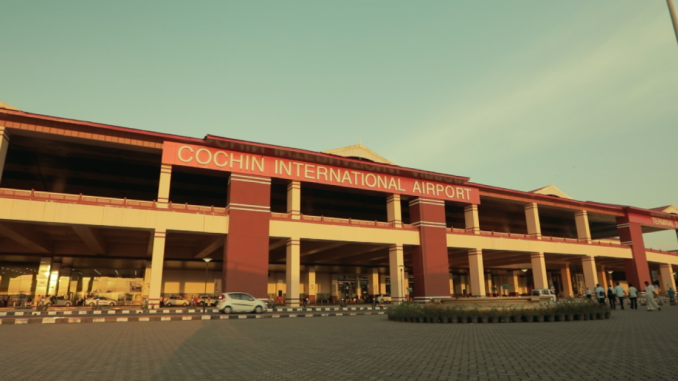
Cochin International Airport is the world’s first solar power airport. Its entire operations are powered by solar energy. The biggest and busiest airport of Kerala state in India, and the fourth busiest airport in India in terms of international traffic, the solar project was pioneered by Managing Director Vattavayalil Joseph Kurian. Cochin International Airport has won the Champions of the Earth Award in the Entrepreneurial Vision category.
Curbing our environmental footprint
Earlier this month, Cochin International Airport was shut down. Severe flooding was just another stark reminder of the urgent need to address our global warming crisis. We believe we are already one step ahead of the curve. As one of the busiest airports in India, we are taking rapid steps to curb our carbon footprint and improve our energy efficiency.
When the price of power jumped from 6 to 10 cents per unit of electricity in 2012, we started to consider alternative powersources. At the time, solar power was becoming a more popular energy source. We wanted to explore the possibilities to harness this eco-friendly option and take advantage of our abundant sunshine as a tropical country.
From 100 kilowatts in 2012, today our capacity is 29.5 megawatts of solar energy, providing us with 120,000 units of power every day. We are 100 per cent reliant on renewable energy in all our daily operations – from powering the conveyor belts to the digital systems. We have experienced absolutely no drop in our efficiency or power supply; we also generate a surplus of energy which we can bank for cloudy days or the monsoon season, when sunshine is less frequent.

Extending our capacity
Last year, 10 million people passed through our airport. Of these, 5.5 million were international passengers. Since we became the world’s first fully solar-powered airport, with the inauguration of a dedicated solar plant, we have placed solar panels on terminal roofs, hangars, over a two-kilometre long canal and car parking area. Currently, we have solar plants in eight locations including the biggest plant which is spread over an area of 45 acres.
These solar panels provide the airport with 29.5 megawatts to power its terminals and facilities. The grounds also house a solar farm, where organic vegetables are farmed, to be sold to nearby markets and airport staff.
After we became 100 per cent solar reliant, the government has taken a decision to encourage all airports to source at least two megawatts of power from solar power. There are also new targets in place to ensure that at least 100 gigawatts of power for the national grid are sourced from renewable sources by 2022.
The future is solar
We are already working with airports in other countries, for example Ghana, where we have set up an agreement to assist in installing solar-powered facilities in three airports across the country. We are entering a new era, where energy from renewable resources is the only sustainable solution towards a healthier planet. We are determined to lead the way and pioneer this development.
The Solar Impulse project became the first solar-powered aircraft to circumnavigate the globe in 2015. Last year, solar energy accounted for the biggest share of power generated from new sources. We believe we are paving the way for carbon-neutral air travel. We are optimistic about fully solar powered airlines in future. This is just the beginning.
Source: UN Environment (press release)

Leave a Reply